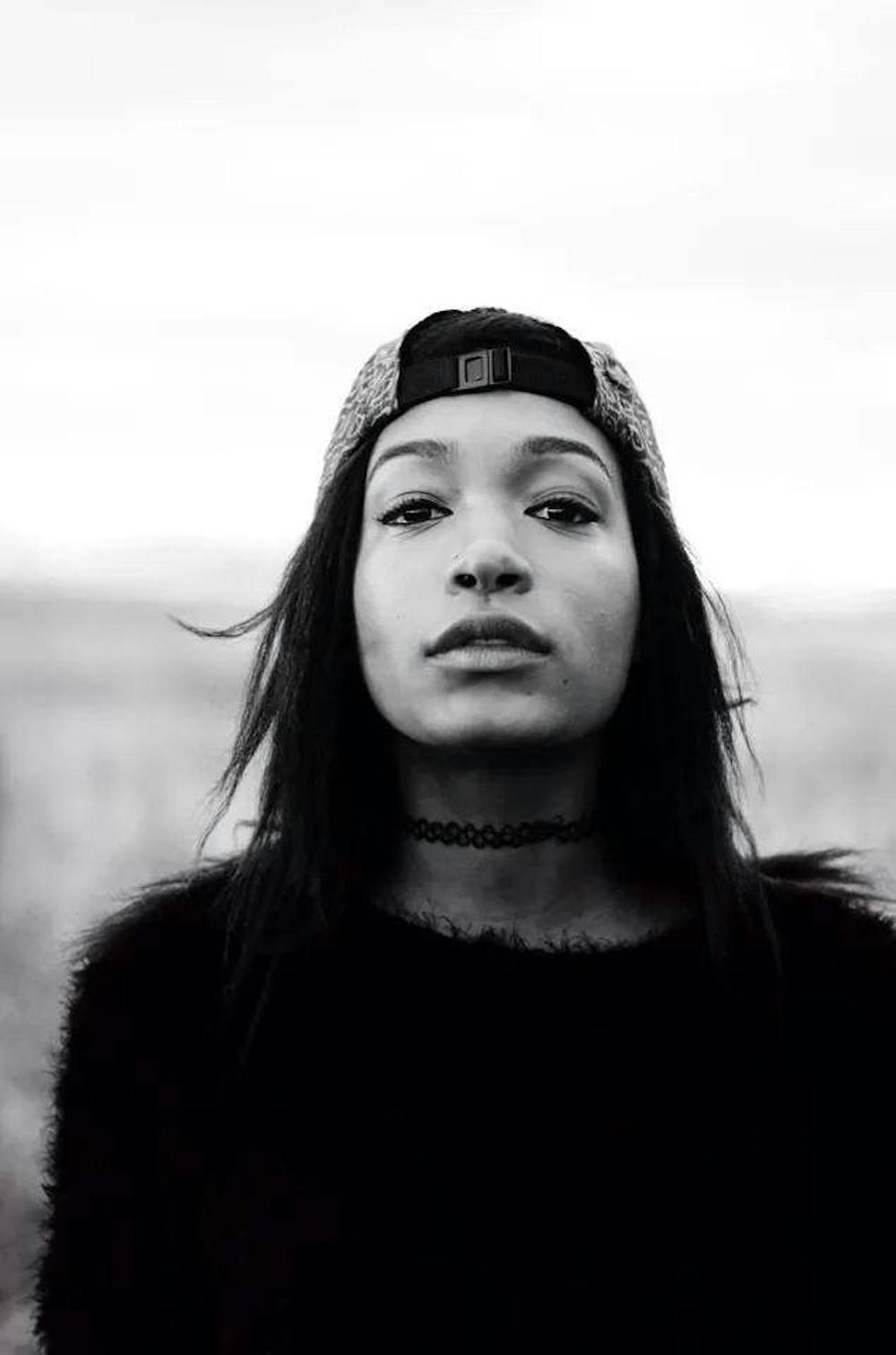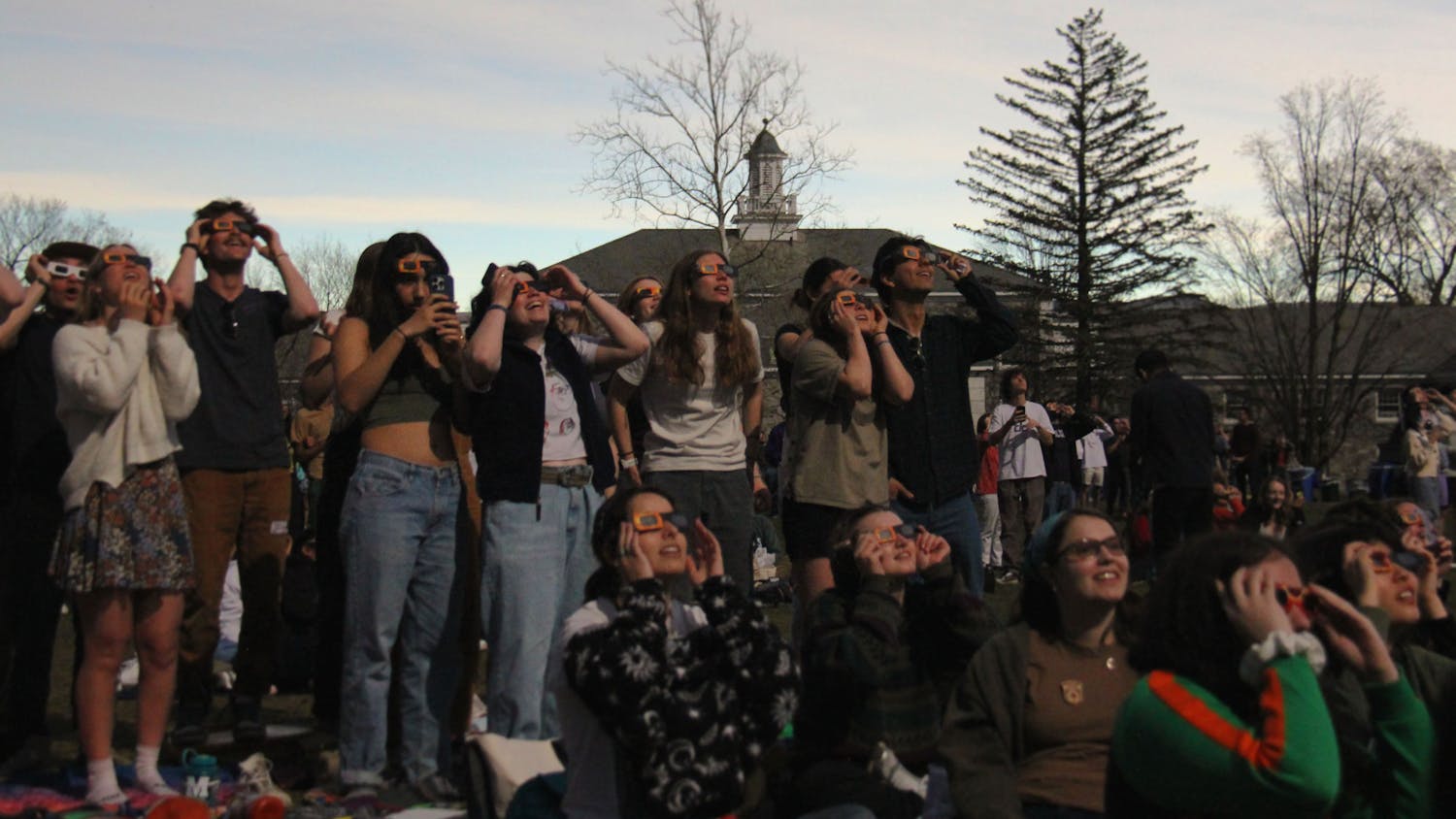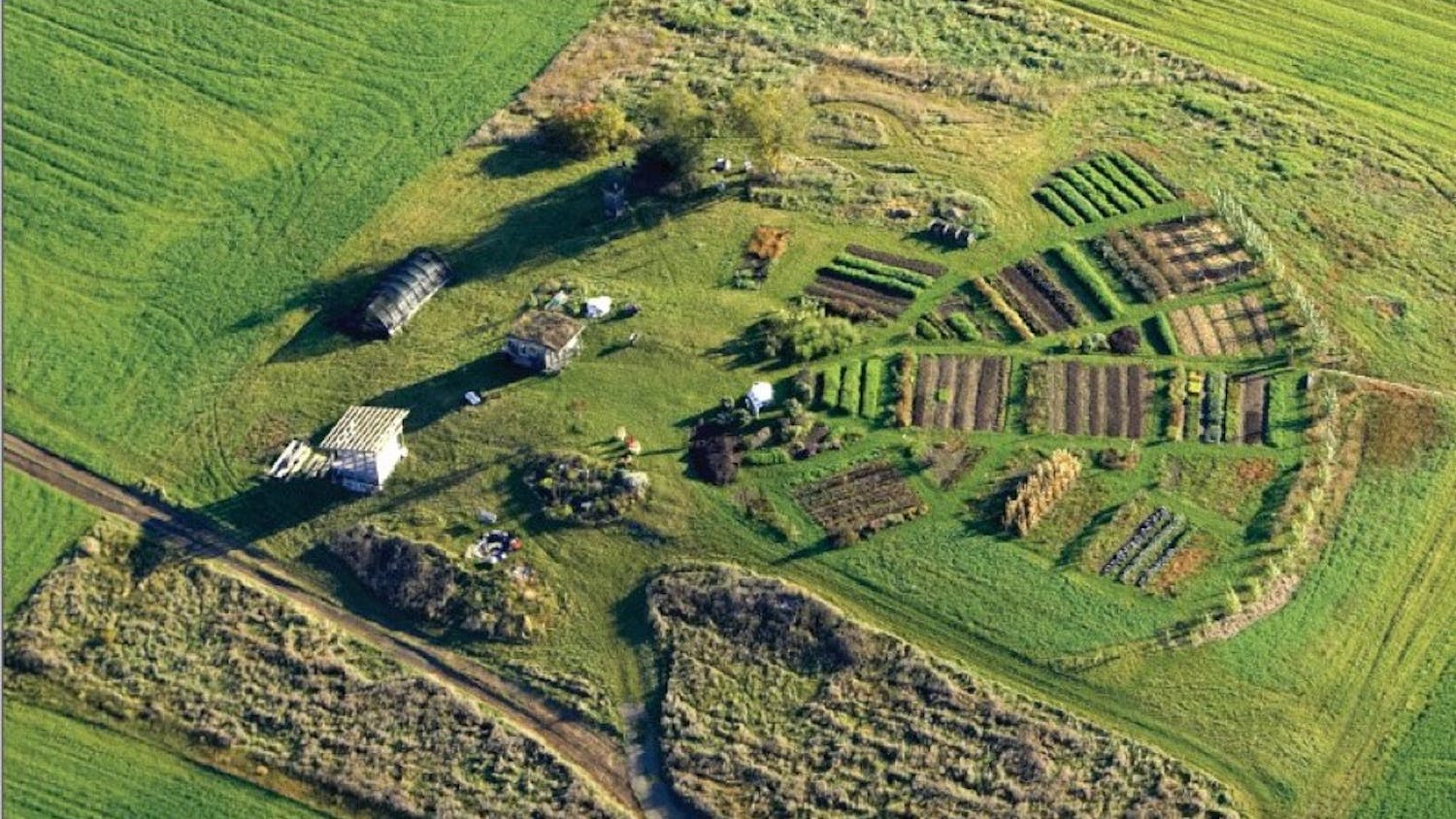In the weeks after protesters disrupted Charles Murray’s planned lecture at Middlebury College last March, administrators here investigated a student whom a Public Safety officer said was at the protest. The student, Addis Fouche-Channer ’17, insists she was never there.
“I pulled a student off the car with the name of Addis,” the officer told private investigators hired by the college, according to a transcript of the conversation obtained by The Campus. “She had a comment about, you can’t do this to me. Just saying other things. And I thought she was going to get into this racial thing with me.”
In interviews with private investigators and the Middlebury police in March, the officer verbally identified Fouche-Channer by name as the one he pulled off the car driven by college spokesman Bill Burger, which served as the escape vehicle for Charles Murray and Allison Stanger.
The officer gave no other evidence that Fouche-Channer was there, the transcripts show. The Campus is choosing not to release the officer’s name because of the volatility of the situation.
Fouche-Channer went through the college judicial process in the spring and was cleared of wrongdoing after a judicial dean determined she was not at the protest. After Fouche-Channer, who is black, graduated in May, she filed a formal complaint that she had been racially profiled by the officer. The Title IX office then launched a second investigation over the summer that lasted until mid-September, months after the March protest.
A decision was not reached until Tuesday, Sept. 26, when a college human relations officer (HRO) told Fouche-Channer the college does not believe she was racially profiled. They now believe she was at the protest. This decision directly contradicted the judicial dean’s determination in May.
The HRO said the Public Safety officer’s “identification” of Fouche-Channer “was corroborated by other credible evidence.” He explicitly cited only one new piece of evidence in a synopsis of the decision: a statement by a “friend” who said Fouche-Channer was at the car. The HRO did not respond to a query asking the name or relationship of that person to Fouche-Channer. The Campus is choosing not to release the names of the investigators because of the volatility of the situation.
This investigation, which was launched over the summer and consisted of 22 interviews conducted in June through at least August, was based on a preponderance of the evidence standard, in which the side with 51 percent or greater likelihood is ruled in favor.
“Even when the Middlebury judicial system concluded that I was not involved with the protests on March 2nd, [the summer investigator] still conducted his own identical investigation, as if there was still a chance that I was lying about my location during the protest,” Fouche-Channer told The Campus prior to reading the college’s synopsis. “His job was to figure out if [the Public Safety officer] was racially profiling me, not whether I was telling the truth or not. That had already been determined weeks before. Throughout this process I was guilty before I was proven innocent.”
Last spring, when college judicial officers concluded that Fouche-Channer was not at the protest, a key piece of evidence used in the investigation was Wi-Fi logs that showed her location on the night of March 2. The logs were taken from IT’s wireless network interface and required Fouche-Channer’s express permission to release.
During the course of that investigation last spring, an official in the college’s IT department submitted a written statement to judicial officers on Middlebury letterhead that pinpointed Fouche-Channer’s location during the time of the protest.
“Given this data, it is reasonable to believe that the devices associated with [Fouche-Channer] were connected and active in the vicinity of Proctor Dining from approximately 5:33 p.m. through at least 7:25 p.m. on March 2,” the official said. “At 7:48 p.m., the student’s iPhone connected to a wireless access point in Athletics (Athletics-Nelson-ClimbingWall) and remained in the vicinity of Athletics until at least 9:48 p.m.”
The judicial officer accepted these logs as proof that Fouche-Channer was not at the protest or Burger’s car.
But now, per the synopsis of the summer investigator’s report, the college says that the Wi-Fi evidence Fouche-Channer gathered from the school’s IT department last spring “was not necessarily an accurate or reliable indicator of Wi-Fi activity.”
“How is it possible that during an identical investigation, information supplied by the school is now not enough?” Fouche-Channer said in response to the report.
The HRO also said that “because this is a confidential matter” he is not releasing a written decision electronically. He told Fouche-Channer that she can review the report in his office by appointment during business hours. In effect, Fouche-Channer, who lives in New York City, can only view the document by physically driving to campus.
“Following a thorough investigation, Middlebury College has determined that a Public Safety officer did not violate Middlebury policies or engage in any form of profiling when he identified a former student as having participated in an incident on campus last March,” the college said in a statement to The Campus. “The officer’s identification of the former student as a participant was corroborated by other evidence, including eyewitness testimony.”
The Spring Investigation
After Fouche-Channer was accused of being at the protest, the Middlebury police requested an interview with her on March 20 on the basis of the Public Safety officer’s testimony.
“We are trying to identify who might have assaulted Ms. Stanger,” the policeman wrote in an email. Fouche-Channer declined the interview.
Private investigators, two from law firms in Burlington and one from a firm in Middlebury, asked Fouche-Channer on April 21 to “offer your statement.” She declined their interview request three times.
One of two judicial deans, who met with students the investigators had identified, then sent a letter on May 9 charging Fouche-Channer with violating college policy.
“As a result of allegations regarding your conduct at that event, concerns were raised that you may have violated Middlebury’s Demonstrations and Protests policy,” the dean wrote. The case would be heard by the community judicial board because it was a “significant” non-academic policy violation.
The letter said Fouche-Channer could opt to have a “disposition without hearing,” in which students “who do not contest the charges” may ask a judicial dean to adjudicate unilaterally. In effect, she could either go before the judicial board or have the dean make a final judgment on her innocence or guilt.
She chose neither option and instead contested the allegation.
Fouche-Channer described to The Campus her quest to provide the dean with evidence that she was not at the protest — including the aforementioned Wi-Fi logs.
She gathered five statements from friends and a coworker describing their interactions with her before, during and after the time of the protest. She forwarded blog posts for her Chinese class and emails she sent that evening. She also pulled a step counter from her phone that showed increased activity when she was at the gym.
“There’s literally five or six testimonies that place me anywhere else but that protest, and this is actually up for debate because one Public Safety officer couldn’t decide one black person from another person in the dark?” Fouche-Channer said to the judicial dean.
“That may be the case, I don’t know, but he says very clearly that he saw you,” the dean replied.
When Fouche-Channer was first told that she had been accused of being at the car, she flatly said that was impossible. The judicial dean asked, “Do you have any way to prove or demonstrate that?”
The dean said if Fouche-Channer could not supply conclusive evidence that she was in Proctor from 6:45 to 7:30 p.m., the case would go to a full hearing by the judicial board. If other evidence corroborated her claim, the dean said, “then we can 100 percent say that there’s no need to proceed.”
On May 13, the dean ordered judgment in an email to Fouche-Channer. With IT’s Wi-Fi logs in hand, the dean wrote, “there does not seem to be a good reason to move forward with a hearing.”
Fouche-Channer described how the judicial process affected her during her senior spring.
“I spent hours consulting my mentors, collecting evidence, scheduling meetings and trying to manage my own stress and mental health during this process,” Fouche-Channer said. “It was extremely taxing, especially during my last finals week and last few days at Middlebury. On top of this I was also trying to finalize a job. This process made my last moments on campus so much more anxiety ridden and upsetting than you could imagine.”
The Summer Investigation
The saga did not end when Fouche-Channer graduated. Over the summer, she contacted Public Safety seeking an apology from the officer whom she said had racially profiled her. This prompted the formal internal investigation over the summer into whether the officer violated Middlebury’s anti-discrimination policy.
On June 30, the aforementioned summer investigator videochatted with Fouche-Channer to address her charge that the Public Safety officer racially profiled her.
“What I can do is help to find out if [the officer] is a bigot,” the summer investigator said to Fouche-Channer. “And if he’s a bigot, and he falsely identified you because of your race or because of any other protected characteristic, then I personally don’t want him working at Middlebury College.”
The investigator sought to determine whether Fouche-Channer was at Bill Burger’s car. On July 18, the investigator told her, “It has become clear that some additional information will be extremely helpful to an effort to corroborate your claims.”
He asked Fouche-Channer to provide “all correspondence (emails, texts, social media posts, etc.) and all other work that you performed while you were at Proctor during the early evening hours of March 2, 2017,” as well as “copies of all of your correspondence (emails, texts, social media posts, etc.) with others from the time you left Proctor until the end of the day (midnight) on March 2, 2017.”
The Campus spoke with one student who was at Bill Burger’s car and was contacted in August by the investigator. The student, who requested anonymity fearing retribution from the college, said the investigator asked where Fouche-Channer was during the day and night of March 2. The investigator also tried repeatedly to establish whether someone wearing pink was at the car, according to the student, who said definitively that Fouche-Channer was not at the car.
“Throughout this investigative process there’s never been an attempt to hold administrators accountable,” the student said. “Their only focus is the ruthless and unrelenting path of trying to identify and punish students.”
Fouche-Channer still maintains she was not at the protest. After the synopsis of the investigation was released on Tuesday, she criticized how her racial profiling complaint was handled.
“The way that this case was processed is appalling. I have multiple pieces of evidence both supporting myself and opposing [the Public Safety officer’s] supposed innocence, but this still was not enough,” she said.
“My advice to current students, especially those of color, is to beware of . . . the Middlebury safety system as a whole. Racial profiling and racism are alive in the very institutions set up to protect us.”
A version of this story originally appeared online last Friday. This is an updated and expanded version. The Campus will continue reporting this story as it develops.




